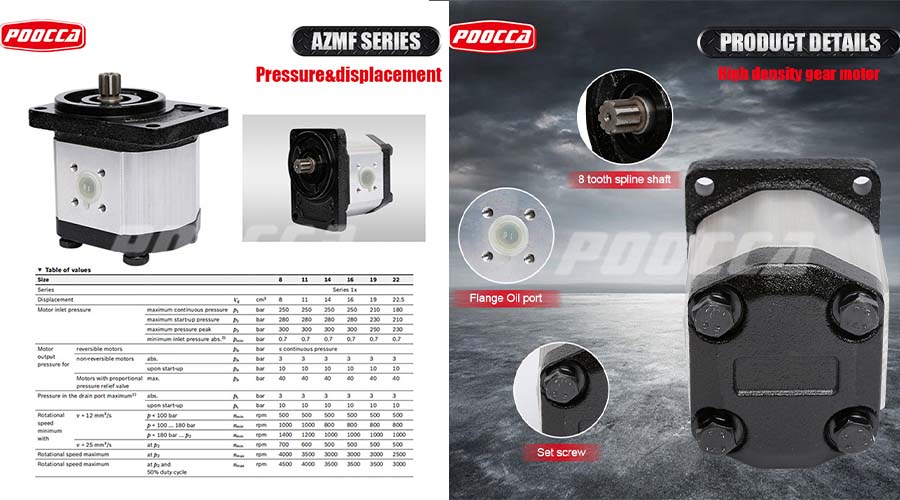Introduction:
Gear motors and hydraulic motors are two types of mechanical devices that provide rotational motion for various applications. Despite serving similar purposes, they operate on different principles and possess distinct characteristics. In this article, we will explore the key differences between gear motors and hydraulic motors.
Gear Motors:
Gear motors are a type of electric motor integrated with gears to transfer mechanical energy from the motor to the driven load. They are widely used in various industries due to their simplicity, efficiency, and precise speed control. The gear arrangement allows for speed reduction or increase, providing the necessary torque for different applications.
Hydraulic Motors:
Hydraulic motors, on the other hand, are mechanical actuators that convert hydraulic pressure into rotary motion. They operate on the principle of fluid dynamics and are often used in heavy-duty applications, where high torque output is required. Hydraulic motors find extensive use in construction machinery, industrial equipment, and marine applications.
Power Source:
Gear motors are electrically powered and commonly used in systems where electricity is readily available. They can be connected directly to the power source, making them convenient for various applications. Hydraulic motors, however, rely on pressurized hydraulic fluid to function, necessitating a hydraulic pump or other fluid power sources.
Efficiency:
Gear motors generally offer higher efficiency compared to hydraulic motors, especially in low-speed applications. Hydraulic systems may experience energy losses due to fluid friction and other hydraulic losses, making them somewhat less efficient overall.
Speed Control:
Gear motors provide precise speed control through gear ratio selection. By changing the gear configuration, the rotational speed can be adjusted as required. Hydraulic motors, on the other hand, have less precise speed control since they depend on hydraulic flow and pressure variations.
Torque Output:
Hydraulic motors excel in delivering high torque output at low speeds, making them ideal for heavy-duty tasks. Gear motors may not offer the same level of torque output, especially at lower speeds, limiting their use in certain applications.
Noise Levels:
Gear motors are generally quieter during operation, especially in comparison to hydraulic motors. Hydraulic motors can generate significant noise due to fluid flow and pressure changes.
Maintenance:
Gear motors require less maintenance since they have fewer components and no hydraulic fluid that needs changing or filtering. Hydraulic motors, however, demand regular maintenance, including fluid replacement, filtration, and monitoring for potential leaks.
Size and Weight:
Gear motors are typically more compact and lighter than hydraulic motors of similar power output, making them suitable for applications with space constraints.
Cost:
Gear motors are generally more cost-effective, especially for lower power applications, as they have fewer components and simpler construction. Hydraulic motors can be more expensive due to the additional complexity of hydraulic systems.
Conclusion:
In summary, gear motors and hydraulic motors are distinct types of motors with differing power sources, efficiency levels, speed control, torque output, and maintenance requirements. Understanding their differences is essential for selecting the most appropriate motor for specific applications, considering factors such as power, speed, space limitations, and budget constraints.
FAQs:
Q: Are gear motors quieter than hydraulic motors?
A: Yes, gear motors tend to produce less noise compared to hydraulic motors.
Q: Which motor is more suitable for heavy lifting tasks?
A: Hydraulic motors are better suited for heavy lifting due to their high force capabilities.
Q: Do gear motors require less maintenance?
A: Yes, gear motors generally require less maintenance compared to hydraulic motors.
Q: Can gear motors be used in precision applications?
A: Absolutely! Gear motors are highly suitable for precision tasks.
Q: Do hydraulic motors have higher power density?
A: Yes, hydraulic motors boast higher power density compared to gear motors.
Post time: Jul-20-2023





